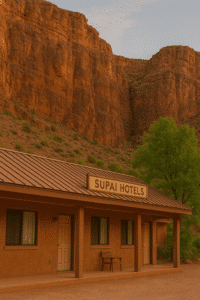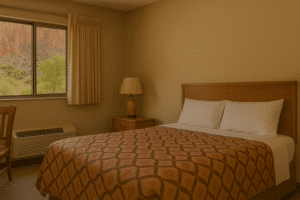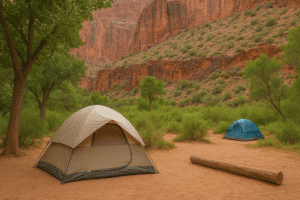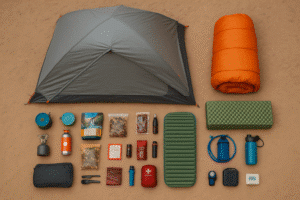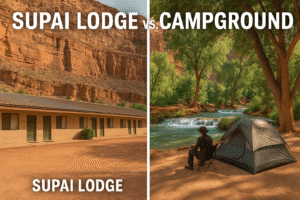Why Lodging Matters in Supai
When you’re planning a trip to Supai, one of the first questions you’ll ask yourself is: Where am I going to sleep?
Unlike Sedona or Flagstaff, you won’t find dozens of hotel chains or Airbnbs to choose from. Supai is different—it’s isolated, sacred land, and accommodation is limited. That’s exactly why choosing the right place to stay matters so much.
I remember my first night in Supai. I had a choice: book the Havasupai Lodge in the village or camp out along Havasu Creek near the waterfalls. Each had its own charm, its own challenges, and its own price tag. The truth is, both options are incredible—it just depends on what kind of traveler you are.
In this guide, I’ll walk you through:
The main Supai hotel (Havasupai Lodge)
The campground option
Tips for booking, what to expect, and how to make the most of your stay
Real traveler reviews (TripAdvisor snippets)
Packing and comfort tips for each accommodation style
By the end, you’ll know exactly which option fits your style, budget, and dream adventure.
Havasupai Lodge – The Only Hotel in Supai
Why the Lodge Exists
Unlike most tourist destinations, Supai has just one hotel: the Havasupai Lodge, sometimes simply called the Supai Lodge. It’s located right in the center of Supai Village, steps away from the general store, café, and post office.
The lodge was built to accommodate the growing number of visitors who wanted to experience Supai’s waterfalls but didn’t want to carry heavy camping gear or sleep outdoors. Since then, it has become a lifeline for travelers who want comfort at the bottom of the Grand Canyon.
Location & Accessibility
📍 Address: Supai Village, Arizona (accessible only by foot, mule, or helicopter)
Distance: 8 miles from Hualapai Hilltop to Supai Village, then a short walk from the trail into the village center
Nearby: General store, café, trailheads to Navajo and Havasu Falls
When you first arrive in Supai after hiking the canyon trail, the sight of the lodge feels like an oasis. I remember walking past rows of simple houses, dusty roads, and then spotting the lodge’s white exterior and modest sign. It’s not luxury—it’s survival comfort in the middle of the canyon.
Rooms & Amenities
The Havasupai Lodge offers about 24 rooms, making it one of the most limited accommodation options in the United States. Every room is nearly identical, so it doesn’t matter much which one you book.
Beds: 2 queen beds with fresh linens
Bathroom: Private, with hot shower and toilet
Climate Control: Air conditioning and heating (a lifesaver in desert extremes)
Furniture: Basic—nightstand, dresser, small table and chairs
Housekeeping: Minimal but adequate for multi-night stays
👉 Don’t expect spa robes or room service. But after an 8-mile hike, even a clean bed and hot shower feel like five-star luxury.
Price & Booking
Cost: Around $200–$250 per night
Booking: Only through the Havasupai Reservations Website
Reservations: Open once a year (usually February) and sell out within hours
Deposit: Required at time of booking
👉 Pro Tip: If you miss lodge reservations, you’ll need to book camping instead—there are no other hotels in Supai.
What It’s Like to Stay There
Staying at the lodge puts you right in the middle of Supai Village. You’ll hear mule trains passing outside, see locals going about daily life, and meet other travelers swapping stories on the porch.
For me, waking up at the lodge was surreal. I opened my curtains and saw the canyon cliffs glowing in the morning sun, with the faint sound of Havasu Creek in the distance. It wasn’t glamorous, but it was unforgettable.
Pros & Cons of Havasupai Lodge
Pros:
Private bathroom and hot shower
Air conditioning and heat
Soft bed (luxury compared to camping)
Convenient for those carrying minimal gear
Great for families or travelers not into camping
Cons:
Expensive compared to camping
Very limited availability
No kitchen or dining options on site (must use café/store)
Less scenic than camping near waterfalls
TripAdvisor Review Highlights
Here are a few authentic snippets from travelers:
“The rooms are basic, but after hiking 8 miles it felt like heaven. Hot shower, AC, and clean beds—what more could you ask for?” – TripAdvisor
“Don’t expect luxury. This is a place to rest your head, not a resort. But it’s perfectly fine for a few nights.” – TripAdvisor
“We booked the lodge because we were traveling with kids. It was the right choice—we didn’t have to haul camping gear, and the kids were comfortable.” – TripAdvisor
Tips for Staying at Havasupai Lodge
Bring Snacks & Food: The lodge doesn’t have a restaurant. Stock up at the general store or café.
Pack Light: If you’re staying at the lodge, you don’t need a tent, sleeping pad, or camping stove.
Book Early: Mark your calendar when reservations open. It sells out within hours.
Cash Helps: Credit card machines may not work—carry small bills.
Don’t Expect Wi-Fi: This is unplugged living. Embrace it.
The Campground Experience – Sleeping Beside Turquoise Waters
Why Many Travelers Choose Camping
If the Havasupai Lodge is about comfort, the Havasupai Campground is about immersion. For many, camping is the preferred option, not just because it’s cheaper but because it places you directly in the heart of Supai’s natural beauty.
I’ll never forget waking up at the campground, unzipping my tent, and being greeted by the sound of rushing turquoise water. The canyon walls glowed with the first rays of sunlight, and mist drifted up from Havasu Creek. It felt like stepping into a dream.
Location of the Campground
The Havasupai Campground stretches for nearly one mile along Havasu Creek, beginning about 2 miles past Supai Village and extending between Havasu Falls and Mooney Falls.
Closest Landmark: Just beyond Havasu Falls
Length: ~100 designated spaces, though many are informal
Scenery: Creekside campsites shaded by cottonwood trees
Ambiance: Constant sound of water, star-filled skies at night
The location alone makes it one of the most unforgettable campsites in America.
Amenities & Facilities
Camping here is primitive, but there are a few essentials provided:
Toilets: Composting toilets spaced along the campground trail
Water: Fresh spring water available from a pipe near Fern Spring
Cooking: No stoves provided—bring your own lightweight gear
Trash: Pack in, pack out. You must carry out everything you bring in
Fire: Fires are not allowed; use stoves only
👉 Don’t expect showers or electricity. This is back-to-basics camping with million-dollar views.
What It’s Like to Camp in Supai
Camping transforms Supai from a sightseeing trip into a full wilderness experience.
Daytime: You’ll spend hours swimming in the turquoise pools, hiking between waterfalls, or lounging under shady cottonwoods.
Nighttime: The canyon turns silent except for the creek. Stars blanket the sky—some of the clearest I’ve ever seen.
Morning: Birds sing, the creek sparkles, and hikers quietly prepare breakfast before hitting the trail.
One traveler on TripAdvisor described it perfectly:
“It was the most magical campsite I’ve ever stayed in. Falling asleep to the sound of waterfalls and waking up in a canyon paradise—I didn’t want to leave.” – TripAdvisor
Cost & Booking
Price: About $375–$500 (3-night bundled permit, includes entry fees + camping)
Booking: Only through the Havasupai Reservations Website
Duration: Minimum stay of 3 nights is required
Season: Reservations sell out fast—book the day they open (usually February)
👉 Unlike traditional campgrounds, you can’t just show up and pay for a site. Every camper must have a permit.
Packing for the Campground
Packing for Supai camping is an art—bring too much and you’ll suffer on the hike in, bring too little and you’ll regret it. Here’s what I recommend:
Tent & Groundsheet – Lightweight, weather-resistant
Sleeping Bag & Pad – Nights can dip into the 40s°F, even in summer
Cooking Gear – Small stove, fuel, lighter, collapsible cookware
Food – Dehydrated meals, trail mix, jerky, oatmeal, instant coffee
Water Gear – Filtration system (backup to Fern Spring), hydration pack
Extras – Headlamp, power bank, first aid kit, biodegradable soap
👉 Pro Tip: Many campers hire mule service to carry their heavier gear. It’s worth it if you want to hike light and still enjoy comfort at camp.
Pros & Cons of Camping
Pros:
Close to waterfalls and nature
Cheaper than the lodge
Immersive—best way to connect with Supai
Starry skies and creekside mornings
Cons:
No showers or electricity
Limited amenities (pack everything yourself)
Requires carrying or hiring transport for gear
Can be crowded in peak season
Traveler Reviews
“Camping in Supai is worth every blister. You’ll never sleep anywhere more beautiful.” – TripAdvisor
“The compost toilets weren’t glamorous, but the scenery made me forget all about it.” – TripAdvisor
“Bring a hammock if you can—you’ll thank yourself when you’re napping by the creek.” – TripAdvisor
Tips for the Best Campground Experience
Arrive Early: Campsites are first-come, first-served. The best spots (creekside with shade) go fast.
Use Bear Bags or Canisters: Squirrels are aggressive thieves—protect your food.
Bring Earplugs: The creek is loud, and mule trains sometimes pass through.
Pack Light, Sleep Well: Comfort items (like a good sleeping pad) are worth their weight.
Respect the Environment: Leave no trace—this is sacred land.
Supai Lodge vs. Campground – Which Should You Choose?
The Classic Traveler Dilemma
Every Supai traveler eventually faces the same question: Should I stay at the lodge or camp by the waterfalls?
I’ve done both, and I can tell you there’s no universal answer—it depends on your style, budget, and what you want out of the trip. Some crave the comfort of air conditioning and a hot shower, while others dream of falling asleep under a million stars beside turquoise water.
Here’s a breakdown to help you decide.
Comfort vs. Immersion
Havasupai Lodge: Offers a private bed, bathroom, and AC. Great for those who don’t want to “rough it” after an 8-mile hike.
Campground: Offers front-row access to waterfalls and nature. Ideal for those who love immersion and don’t mind rustic conditions.
👉 If you want to wake up steps from Havasu Falls, camping wins. If you want to wake up in clean sheets, the lodge wins.
Cost Considerations
Lodge: $200–$250 per night, plus permit fees
Campground: $375–$500 total for 3-night permit bundle (includes camping fees)
👉 Camping is cheaper overall, especially if you’re splitting gear costs with a group. But if you factor in mule service for gear, the price gap narrows.
Availability
Lodge: Very limited—24 rooms, sell out within hours of reservations opening
Campground: Larger capacity, but still requires early booking
👉 More travelers secure camping spots than lodge rooms. If you’re late to book, camping may be your only option.
Who Each Option Fits Best
Havasupai Lodge Is Best For:
Families with young children
Travelers who don’t own camping gear
Those who want minimal packing
Visitors with health or mobility issues
People who prioritize showers, AC, and beds
Havasupai Campground Is Best For:
Adventurers and outdoor enthusiasts
Budget-conscious travelers
Photographers wanting sunrise/sunset shots at waterfalls
Backpackers with gear
Anyone craving the full canyon immersion
Scenario Examples
Family with Kids: The lodge is more practical. You’ll avoid hauling camping gear and can keep kids comfortable.
Solo Backpacker: Camping is a no-brainer. It’s cheaper, and you’ll meet fellow travelers along the creek.
Couple on a Romantic Adventure: Depends—camping gives you privacy and stargazing, but the lodge ensures comfort.
Older Travelers: The lodge is easier—less stress, less packing, less strain.
Adventure Junkies: Campground all the way—you’ll feel like you’re living in the wilderness.
My Personal Experience
On my first trip, I stayed at the lodge. After a grueling hike down, I wanted nothing more than a shower and AC. And it was perfect for recovering before exploring waterfalls the next day.
On my second trip, I camped. And while it was tougher, it was magical. Falling asleep to the sound of Havasu Creek and waking up to mist rising from the water was unforgettable.
👉 My advice? If you can, try both at least once in your life. Each tells a different story of Supai.
TripAdvisor Reviews for Each
Havasupai Lodge
“Basic but comfortable. Don’t expect luxury—it’s more like a clean motel. But it felt like heaven after the hike.”
“The AC saved us. Without it, I don’t think my parents could have managed.”
Havasupai Campground
“Hands down the most beautiful place I’ve ever camped. Falling asleep to waterfalls is unbeatable.”
“The toilets weren’t glamorous, but the scenery made me forget about it.”
Quick Comparison Table
| Feature | Havasupai Lodge | Campground |
|---|---|---|
| Cost | $200–$250 per night | $375–$500 for 3 nights (permit) |
| Location | Supai Village (8 miles in) | 2 miles further, by waterfalls |
| Amenities | Private bath, AC, beds | Toilets, spring water, fire-free |
| Scenery | Canyon views from village | Creekside under cottonwoods |
| Ease | No gear required | Must pack or hire mule for gear |
| Vibe | Comfortable, practical | Immersive, adventurous |
Why Booking Supai Lodging Is Tricky
Supai is unlike any other destination in America. With only one hotel and one campground, demand always outpaces supply. The booking process is competitive, the rules are strict, and mistakes can cost you your trip. But with smart planning, you can secure your spot.
I’ve been through this process multiple times—sometimes successfully, sometimes not. Here’s what I’ve learned the hard way, along with tips from other travelers who’ve navigated the system.
How to Book the Havasupai Lodge
Create Your Account in Advance
Go to the Havasupai Reservations Website
Make your login before reservation day
Add payment details if possible to save time
Know the Release Date
Reservations usually open in February
Mark it in your calendar, set reminders, and be ready at launch time
Act Fast
Rooms sell out in minutes
Have your preferred dates and backup dates ready
Minimum Nights
Expect to book at least 3 nights
Shorter stays aren’t available
Print Confirmation
Rangers require a printed permit confirmation at the trailhead
👉 Pro Tip: Use multiple devices (laptop + phone) when booking. Sometimes one refreshes faster than the other.
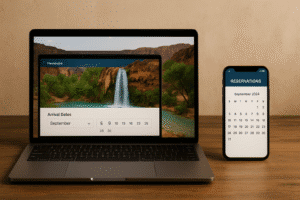
How to Book the Campground
Same Website – Reservations are also through the official site.
Choose Dates Wisely – Midweek often has better availability than weekends.
Be Flexible – If you can’t get your ideal dates, be open to different months.
Understand the Package – All campground permits are sold in bundled 3-night stays.
Transfer Option – If you can’t go, you can transfer your reservation to another person through the website (not through Facebook or Craigslist).
Common Booking Mistakes (and How to Avoid Them)
Mistake 1: Logging in late → Rooms and permits are gone within an hour.
Mistake 2: Only picking one date → Always have backup options.
Mistake 3: Trying third-party sellers → Scams are common. Stick to the official site.
Mistake 4: Forgetting to print permits → Rangers won’t accept a phone screenshot.
Mistake 5: Overlooking mule reservations → If you need mule support, book it at the same time.
Budget Hacks for Lodging in Supai
Go Camping if Possible – It’s cheaper overall, and gear can be shared in groups.
Split Costs – Traveling with friends? Divide mule costs or share a tent.
Bring Your Own Food – The café is convenient but pricey; dehydrated meals save money.
Avoid Summer Crowds – Prices don’t change, but midweek in spring/fall means fewer people and less stress.
Insider Advice from Past Travelers
“Have your entire group ready with multiple accounts. The system often crashes, so it helps if more than one person is trying to book.” – TripAdvisor
“If you can’t get the lodge, don’t panic. Camping is the real magic of Supai anyway.” – TripAdvisor
“We booked in February and the lodge was gone in under 10 minutes. Luckily, we snagged camping spots instead.” – TripAdvisor
Challenge 1: The Refund Policy
There are no refunds for cancellations. If you can’t make it, you must transfer your reservation.
Challenge 2: Mule Reservations
Mules are limited and book separately. If you rely on them, secure a spot early.
Challenge 3: Weather Risks
Flash floods in July–August can close trails. Even with a reservation, your trip could be canceled.
Challenge 4: No Alternatives Nearby
Unlike other destinations, you can’t “just find another hotel.” If you don’t book, you can’t stay.
How to Decide Between Lodge & Campground (Final Guidance)
Still torn? Here’s my final advice:
Pick the Lodge if:
Comfort matters more than scenery
You’re traveling with kids or older relatives
You don’t own camping gear
Pick the Campground if:
You want the most magical Supai experience
You’re a photographer or adventurer
You’re on a budget
👉 Personally, I recommend the campground for first-timers. Supai isn’t just a trip—it’s an immersion, and nothing beats waking up by Havasu Creek.
Wrap-Up: Where I Stayed
I stayed at the lodge my first trip and camped the second time. Both were unforgettable in different ways. The lodge gave me comfort and recovery, while the campground gave me connection and magic. If I return again (and I will), I’ll camp—it’s where Supai feels most alive.
